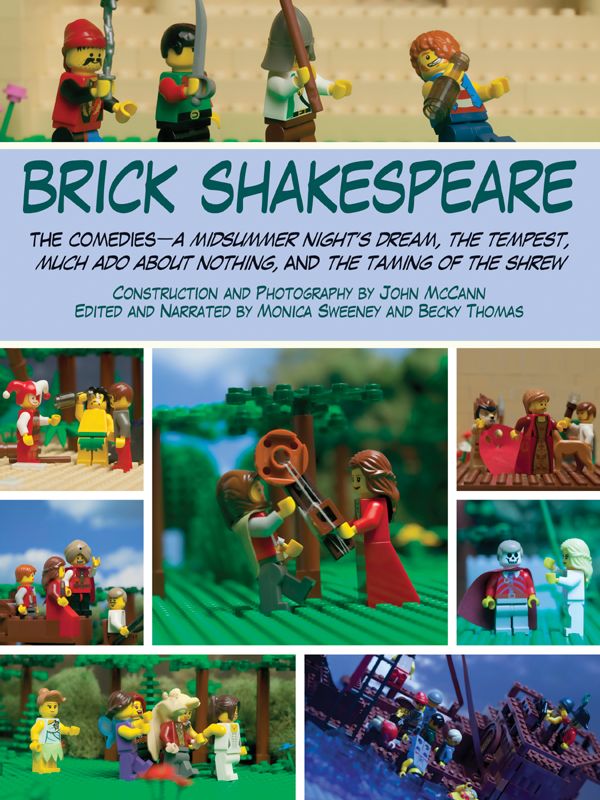Brick Shakespeare: The ComediesA Midsummer Night's Dream, The Tempest, Much Ado About Nothing, and The Taming of the Shrew
Authors: John McCann,Monica Sweeney,Becky Thomas




LEGO® is a trademark of the LEGO® Group of companies which does not sponsor, authorize, or endorse this book.
Copyright © 2013 by Hollan Publishing, Inc.
All Rights Reserved. No part of this book may be reproduced in any manner without the express written consent of the publisher, except in the case of brief excerpts in critical reviews or articles. All inquiries should be addressed to Skyhorse Publishing, 307 West 36th Street, 11th Floor, New York, NY 100018.
Skyhorse Publishing books may be purchased in bulk at special discounts for sales promotion, corporate gifts, fundraising, or educational purposes. Special editions can also be created to specifications. For details, contact the Special Sales Department, Skyhorse Publishing, 307 West 36th Street, 11th Floor, New York, NY 10018 or
[email protected]
.
Skyhorse and Skyhorse Publishing are registered trademarks of Skyhorse Publishing, Inc.®, a Delaware corporation.
10 9 8 7 6 5 4 3 2 1
Library of Congress Cataloging-in-Publication Data is available on file.
ISBN: 978-1-62873-733-2
Printed in China
Editor: Kelsie Besaw
Designer: Brian Peterson
Production manager: Abigail Gehring
A
CKNOWLEDGMENTS
This second installment of
Brick Shakespeare
would not be possible without our fantastic editor, Kelsie Besaw, whose effort and attention to detail really made this book great. To Tony Lyons, Bill Wolfsthal, and Linda Biagi, for giving us the opportunity to produce such a creative project, and to everyone at Skyhorse for making it all happen. Our special thanks go to Allan Penn, for all of the extra effort with our photography, and to Holly Schmidt for the continued encouragement and support.
John would like to give a big thank you to his parents, Cathy and Ed, and to the Clemmers. Becky would like to thank her brother, Michael, for always sharing his toys with her. And Monica would like to thank her Grandma, for always giving her a place for LEGOland.
I
NTRODUCTION
William Shakespeare wrote or collaborated on thirty-eight plays during his lifetime, and among them were seventeen comedies. During the Elizabethan era when Shakespeare lived and wrote, the term “comedy” did not mean that a play was funny, but that it had a lighter tone and a happy ending, usually involving a marriage or two. But that does not mean Shakespeare’s comedies are not funny! Shakespeare was a master of wit and wordplay, which is why his skill is still charming audiences to this day.
While many of Shakespeare’s tragedies explore dark themes like death, betrayal, murder, and revenge, his comedies focus on themes like courtship and marriage, using them to look closer at social pressures, relationships, and human behavior of the time period. The lighter tone is deceptive, as Shakespeare did not hesitate to use his comedies to turn a critical eye (and pen) to the follies of the time.
Brick Shakespeare: The Comedies
presents four of the Bard’s most famous and clever comic works in LEGO form, each of which has been carefully abridged. The fun brick scenes depict Shakespeare’s plays just as they were originally written (perhaps with more plastic than he had imagined), with helpful narrative in between to explain what we did not include. Whether you are just being introduced to Shakespeare or are a seasoned devotee, we hope you enjoy this creative and constructive new take on Shakespeare’s comedies!
C
ONTENTS
A Midsummer Night’s Dream

I
NTRODUCTION
A
Midsummer Night’s Dream
is a magical, whimsical comedy that, while written around 1590, remains a fan favorite on the stage! The play explores themes of love and marriage and ends, as all good Elizabethan comedies should, with a wedding celebration. It also addresses ideas of reality and perception: the title itself refers to the characters’ strange experiences that they encounter during the play, which seem dreamlike and unreal when they awaken the next morning.
The action of the play centers around three main groups: the young lovers, the laborers-turned-actors, and the fairies, all of whom find themselves deep in the forest surrounding Athens. The forest itself stands apart from the civilized world of Athens, and the young lovers and the actors seek out this space in hopes of escaping the “real world” where parents and authority figures try to control their paths.
Nonetheless, the forest has its own set of authority figures: the king and queen of the fairies, Oberon and Titania. King Oberon attempts to bring order to his domain by neatly pairing off the young lovers, as Puck later says, “Jack shall have Jill;/Nought shall go ill” (III.ii.508–9). Oberon uses magic to manipulate the young lovers and make his targets fall madly in love with the next person they see, a plan with unexpected but hilarious consequences. The forest setting highlights the strange and mysterious things that happen there, where affections are distorted, and voices and strange noises whisper through the trees. In the woods, everything gets turned around before it is finally set right.
This comedy is one of the most loved of Shakespeare’s plays because it includes all the best aspects of the genre: a magical setting, young lovers thwarted by social pressures, and a hilariously acerbic catfight for good measure. Much of the draw of this play, in Shakespeare’s time and our own, is the dynamic theatricality of the production. There are slapstick humor and special effects, magical transformations and creatures, all of which delight audiences, even when played out on the page rather than the stage.
D
RAMATIS
P
ERSONAE

THESEUS, Duke of Athens

EGEUS, Father to Hermia

LYSANDER, in love with Hermia

